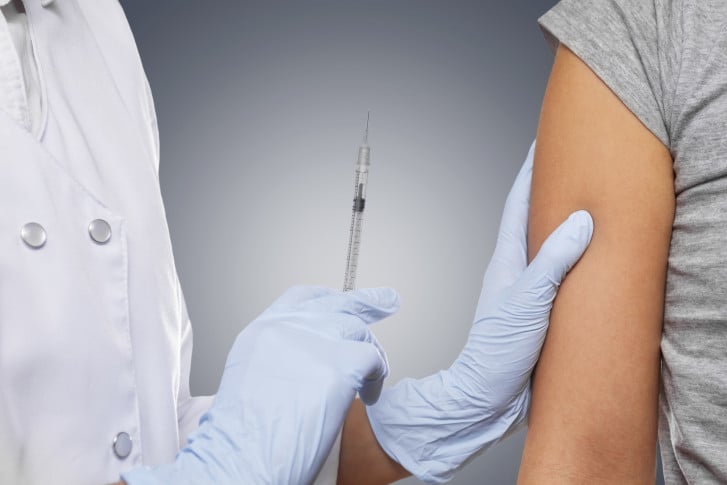Contents:
- Medical Video: Many Adults Missing Important Vaccines: Study
- What are the types of vaccines for adults?
- 1. Influenza vaccine
- 2. Pneumonia vaccine
- 3. HPV vaccine
- 4. Tetanus, diphtheria and pertussis vaccine
- 5. Hepatitis A vaccine
- 6. Hepatitis B vaccine
- 7. Measles, mumps and rubella vaccines (MMR)
- 8. Varicella vaccine (chickenpox)
- 9. Other vaccines
Medical Video: Many Adults Missing Important Vaccines: Study
Many people think that vaccines are only needed by infants and toddlers. In fact, adults also need to get a vaccine to protect themselves from various diseases. Unfortunately, awareness of adults doing vaccines is still low; either because the cost of vaccines is not cheap, don't know what vaccines are needed, don't know the schedule of vaccines should be, or because they really don't believe that vaccines can protect you from disease.
What are the types of vaccines for adults?
1. Influenza vaccine
This disease is usually characterized by coughing, fever, and muscle aches. Influenza vaccine is given once a year to prevent the occurrence of flu that is easily transmitted, especially when the transition season or rain.
2. Pneumonia vaccine
Pneumonia is a pneumococcal disease caused by bacteria Streptococcus which attacks the lower airway and spreads through coughing, sneezing, and when talking. Pneumonia attacks are more susceptible to people over 60 years of age or people with low endurance.
3. HPV vaccine
Cervical cancer is a cancer caused by Human Papiloma Virus which is transmitted through sexual contact. This vaccine is highly recommended to be given before you have sexual intercourse, because early vaccination can increase the effectiveness of vaccines in preventing cervical cancer.
The HPV vaccine can begin to be given at the age of 11 or 12 years. The second HPV vaccine can be given 1 to 2 months after the first HPV vaccine. And the third HPV vaccine can be given 6 months after the first HPV vaccine.
4. Tetanus, diphtheria and pertussis vaccine
This vaccine is given to protect you from three diseases, namely tetanus which causes muscle spasms and tightening of the jaw muscles to the extreme; diphtheria which causes respiratory problems, paralysis, heart failure and death; and pertussis or whooping cough. This vaccine is usually given when you are a toddler, however, you still need to vaccinate at least once every 10 years.
5. Hepatitis A vaccine
Hepatitis A is an acute disease caused by the hepatitis A virus that is spread by the feces / feces of the patient; usually through food. This disease usually attacks children; so the vaccine can also be given when the child is 2 years old. This vaccination also needs to be repeated every 10 years.
6. Hepatitis B vaccine
Hepatitis B is a disease caused by the hepatitis B virus that can cause acute or chronic liver inflammation which in a small number of cases can lead to liver cirrhosis or liver cancer. Actually, this vaccine has been given when you are new, but can be given again every six months.
7. Measles, mumps and rubella vaccines (MMR)
This vaccine is given to prevent three diseases, namely measles or measles, mumps or mumps, and rubella or German measles. This vaccine is given if you work in a health care facility and often travel; You need two doses of vaccine with a minimum distance of 4 weeks. Vaccines can be passed every 10 years.
8. Varicella vaccine (chickenpox)
This vaccine is given to people who have never been exposed to chickenpox, people who are close to people with chickenpox, or healthy adults who are not pregnant. The vaccine consists of 2 doses given at a distance of 4-8 weeks; this vaccine can be given at any time. Vaccines can be repeated once every 20 years.
Because this vaccine is made with live viruses, you don't need to get it if you have a weakened immune system due to illness (such as cancer or HIV) or medical treatment (such as steroids or chemotherapy).
9. Other vaccines
Certain vaccines are recommended for adults, especially if you are traveling to certain countries, such as meningitis vaccines given to pilgrims who are pilgrims or those who want to go to the sub-Saharan region of Africa. Vaccine yellow feverand japanese encephalitis given if you travel to a South African country. Rabies vaccine given to people who often contact animals; such as veterinarians, pet owners, laboratory workers, or going to endemic areas at risk of contact with animals or individuals suffering from rabies.
You can get every vaccine unless you have allergies or certain conditions. You can consult a doctor to find out if you can vaccinate and what side effects might occur.












